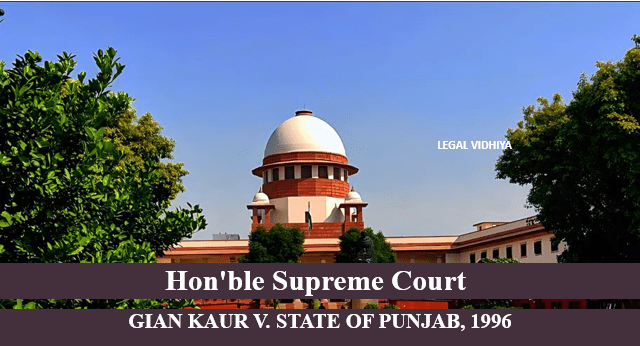
| Citation | AIR 1996 SC 946, 1996 SCC (2) 648 |
| Date of Judgement | 21st March, 1996 |
| Court | Supreme Court of India |
| Appellant | Gian Kaur |
| Respondent | State of Punjab |
| Bench | Verma, Jagdish Saran (J)Ray, G.N. (J)Singh N.P. (J)Faizan Uddin (J)Nanavati G.T. (J) |
| Referred | The Constitution of India,1949- Articles 12, 14, 21.Indian Penal Code, 1860- Sections 306, 309.The Criminal Procedure Code, 1973- Sections 360, 562. |
FACTS:
Gian Gaur (Appellant) and her husband Harbans Singh had committed the offence of Abetment to Suicide Section 306 of IPC, 1860 of their daughter-in-law. They were convicted by the Trial Court and each sentenced to six years and fine of Rs. 2,000/-, or, in default, further for nine months, for abetting the commission of suicide by Kulwant Kaur. On appeal to the High Court, the conviction of both has been maintained but the sentence of Gian Kaur alone has been reduced for three years. These appeals by special leave are against their conviction and sentence under Section 306, IPC.
They challenged the constitutional validity of Section 306 of the IPC as being violative of Article 21 of the Constitution.
ISSUES:
- Whether Section 306 of Indian Penal Code, 1860 is Constitutionally Valid?
- Whether Article 14 and Article 21 of the Constitution of India is being violated by Section 309 of the Indian Penal Code?
- Whether “Right to Die” is included under Article 21 of the Constitution of India which deals with the “Right to Life”?
ARGUMENTS:
Arguments by Appellant-
The first argument by appellant side was advanced to challenge the constitutional validity of Section 306, IPC rests on the decision in P. Rathinam vs. Union of India and Anr, by a Bench of two Judges of this Court wherein Section 309, IPC has been held to be unconstitutional as violative of Article 21 of the Constitution. It is urged that ‘right to die’ being included in Article 21 of the Constitution as held in P. Rathinam declaring Section 309, IPC to be unconstitutional, any person alletting the commission of suicide by another is merely assisting in the enforcement of the fundamental right under Article 21 and therefore, Section 306 of IPC penalising assisted suicide is equally violative of Article.
Arguments by Respondent-
The State Counsels argued that Section 306 and Section 309 of the Indian Penal Code, 1860 were independent of each other and grooved different offences. They believed that a Section 306 can exist without Section 309. Hence, Section 306 isn’t invalid and not in violation of either Articles 14 or 21. Another Counsel contented that Section 306 was independent of Section 306 of IPC and he didn’t support the held in P. Rathinam vs. Union of India and Anr to incorporate that “Right to Die” under Article 21 of the Constitution, inspite he supported the conclusion that Section 309 is unconstitutional as it was arbitrary.
JUDGEMENT:
There is no ground to hold that Section 309, IPC is constitutionally invalid. The contrary view taken in P. Rathinam on the basis of the construction made of Article 21 to include Smt. Gian Kaur vs The State of Punjab therein the ‘right to die’ cannot be accepted by us to be correct. That decision cannot be supported even on the basis of Article 14. It follows that Section 309, IPC is not to be treated as unconstitutional for any reason. The reported decisions show that even on conviction under Section 309, IPC, the accused has been dealt with compassion by giving benefit under the Probation of Offenders Act, 1958 or Section 562 of the Code of Criminal Procedure, 1908 corresponding to Section 360 of the Criminal Procedure Code, 1973.
Abetment of suicide or attempted suicide is a distinct offence which is found enacted even in the law of the countries where attempted suicide is not made punishable. Section 306 IPC enacts a distinct offence which can survive independent of Section 309 in the IPC.
REFERENCE:
https://www.juscorpus.com/gian-kaur-v-state-of-punjab/
This case analysis is done by Miss. Rutuja Santosh Kokare of Ismailsaheb Mulla Law College, Satara, Legal Intern at Legal Vidhya.




0 Comments